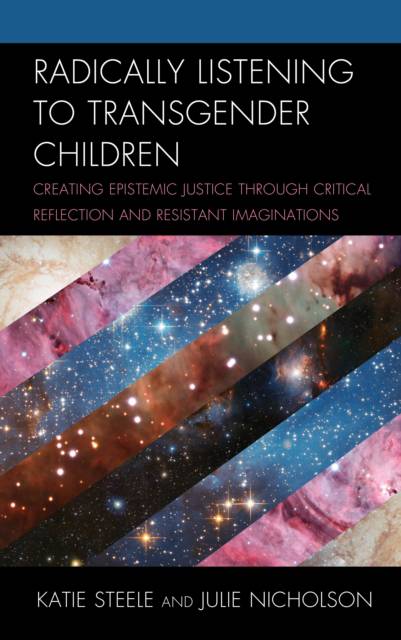
- Afhalen na 1 uur in een winkel met voorraad
- Gratis thuislevering in België vanaf € 30
- Ruim aanbod met 7 miljoen producten
- Afhalen na 1 uur in een winkel met voorraad
- Gratis thuislevering in België vanaf € 30
- Ruim aanbod met 7 miljoen producten
Zoeken
Radically Listening to Transgender Children
Creating Epistemic Justice Through Critical Reflection and Resistant Imaginations
Katie Steele, Julie Nicholson
Hardcover | Engels
€ 195,45
+ 390 punten
Uitvoering
Omschrijving
This book is for early childhood educators committed to learning about gender [in]justice as a foundation for creating gender affirming early learning environments for all children including those who are transgender and gender expansive (TGE). The authors engage in progressive and contemporary thinking about gender acknowledging its complexity, intersectionality, diversity and dynamism. They draw on Miranda Fricker's (2007) concepts of testimonial injustice to discuss how young TGE children are considered "too young" to have gender identities or to truly know themselves and hermeneutical injustice to represent the challenges TGE children face in educational environments that do not provide them with linguistic or interpretive tools to help them fully understand and communicate about their gender. Woven throughout the book are the lived experiences and counter-stories of TGE children and adults that privilege their voices and highlight their right to contribute equally to societal understandings of gender and to access all the tools a given society has available at the time to help them name and understand their own experiences.The authors provide discourse, conceptual frameworks and concrete strategies educators can use to inspire resistant social imaginations (Medina, 2013) and actions that improve gender justice for our youngest children.
Specificaties
Betrokkenen
- Auteur(s):
- Uitgeverij:
Inhoud
- Aantal bladzijden:
- 192
- Taal:
- Engels
Eigenschappen
- Productcode (EAN):
- 9781498590372
- Verschijningsdatum:
- 3/12/2019
- Uitvoering:
- Hardcover
- Formaat:
- Genaaid
- Afmetingen:
- 152 mm x 229 mm
- Gewicht:
- 426 g

Alleen bij Standaard Boekhandel
+ 390 punten op je klantenkaart van Standaard Boekhandel
Beoordelingen
We publiceren alleen reviews die voldoen aan de voorwaarden voor reviews. Bekijk onze voorwaarden voor reviews.







